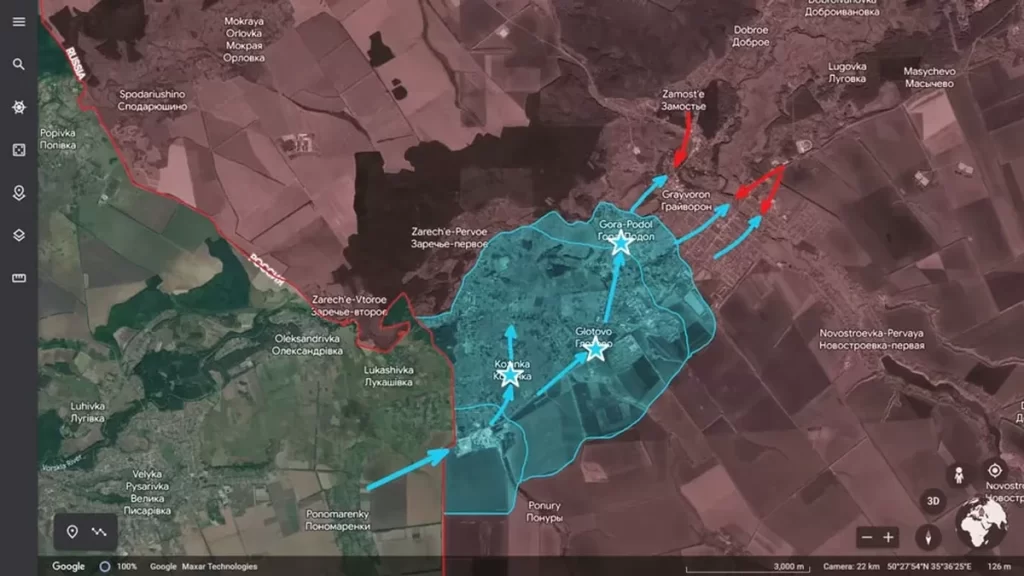The Russian Federation proved to be incapable not only of defeating Ukraine, but also of protecting its own territory. Shortly after the nine-month battle for the small and strategically insignificant city of Bakhmut effectively came to an end, Ukraine-backed anti-Kremlin forces captured portions of Russia’s Belgorod region.
According to reports, on May 22 Ukraine-based Liberty of Russia Legion and the Russian Volunteer Corps have occupied several settlements in western Russia. Their incursion from Ukraine into Belgorod oblast likely represents a part of Kiev’s preparations for the upcoming counteroffensive against the Russian forces in the Donbass, as well as in the Kherson and the Zaporozhye regions.
Given that the Kremlin refuses to declare martial law and a full-scale mobilization, but continues conducting the so-called special military operation whose goals remain rather unclear, the Russian military lacks manpower to control its border with Ukraine. It is, therefore, not surprising that Russian State Duma Defense Committee chairman Andrey Kartapolov said on April 26 that Russian citizens “should defend the country’s borders on their own”.
In order to prevent Ukrainian actions in Russia’s Belgorod, Bryans and Kursk regions, Moscow might be forced to redeploy some of its units from southeastern Ukraine to Western Russia. As a result, the Ukrainian Armed Forces will not have a hard time recapturing parts of the Eastern European country that have been under Russian occupation for more than a year.
More importantly, once Ukraine gets F-16 fighter jets from the West, its military will almost certainly start striking Russian territory. Since the Kremlin repeatedly demonstrated that it does not have any red lines, Ukraine does not fear any consequences if it hits Russian military facilities, be they in southern and western Russia, or in Crimea.
“Possible strikes by the armed forces of Ukraine with American F-16 fighter jets on the territory of Crimea will be seen by Moscow as an attack on one of the regions of Russia,” said Anatoly Antonov, the Russian ambassador to the United States.
Since Russia, to this day, has not responded to the alleged May 3 Ukrainian drone attack on the Kremlin, it is extremely improbable that Moscow would take any serious actions if Kiev starts using F-16 fighter jets to hit targets in Crimea. Moreover, given that Russian President Vladimir Putin, following the Ukrainian “invasion” of Belgorod, had no plans to hold an emergency Security Council meeting, it is not very probable that the Kremlin would change its strategy regarding Ukraine in case of potential F-16 strikes on Russian territory.
In other words, regardless of the situation on the battlefield, Moscow is expected to continue doing business as usual, creating an illusion that the situation is under control. After Ukraine-backed armed insurgents launched attacks in Russia’s Belgorod region, the Kremlin has deployed Colonel-General Alexander Lapin – under whose command Russia lost control over 10 cities in Kharkov region – to lead a “special military operation” in Belgorod. He was filmed in the region acting as a traffic warden, having a Soviet, rather than the Russian flag on his chevron.
With Lapin in charge, Russia has very high chances of losing more territory. Although Ukraine unlikely plans to hold parts of Belgorod region for a long time, its cross-border raids will undoubtedly boost the country’s military’s morale ahead of the inevitable counteroffensive. The Russian population, on the other hand, will feel demoralized, quite aware that their government either cannot or does not want to protect them. As a result, sooner or later a palace coup in the Kremlin could start brewing.
Meanwhile, Russia, unable to protect its own territory, will continue losing influence among its nominal allies. Even though Key Article 4 of the Collective Security Treaty Organization (CSTO) Treaty states that “If one of the States Parties is subjected to aggression by any state or group of states, then this will be considered as aggression against all States Parties to this Treaty”, Moscow did not even attempt to get the CSTO involved in the defense of Belgorod. The Kremlin is quite aware that the Russian-led military bloc exists merely on paper, and that Russia cannot count on its “allies’” support.
“We showed ourselves to be weak and the weak get beaten”, Putin said in 2004, following the Beslan school siege.
Almost 20 years later, Putin is still in charge in the Kremlin, and Russia seems to be much weaker than it was in 2004. It is on its own against Ukraine that is firmly backed by the entire Western civilization. Isolated from the West, without China’s military assistance, abandoned by its allies, with Putin and his oligarchs and corrupt officials pulling the strings in Moscow, Russia is on a verge of another humiliating defeat in Ukraine.
Indeed, the upcoming Ukrainian counteroffensive will bring more humiliation to the country that was believed to have one of the most powerful militaries in the world.

